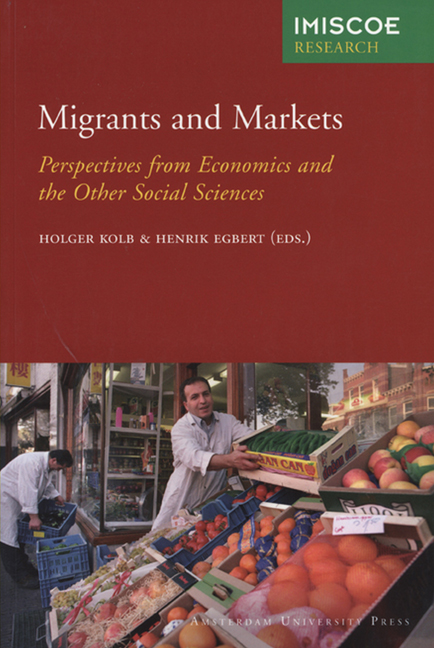Book contents
- Frontmatter
- Contents
- Introduction: Migrants and Markets: Perspectives from Economics and the Other Social Sciences
- The Impact of Immigration on the Labour Market: A Survey
- Investigating the Economic Impact of Immigration on the Host Country: The Case of Norway
- The Exit Option of Labour Migration from East to West Germany: Individual and Contextual Determinants of Unemployed Workers’ Geographic Mobility
- How Recent Amendments in German Immigration Law Affect Decisions: The Case of Polish Doctors
- Educational Selectivity and Labour Market Attainment of Jewish Immigrants from the Former Soviet Union in Israel and Germany in the 1990s
- States as Clubs? The Political Economy of State Membership
- Chinese Student Migration in Europe: A Migration That Nobody Objects To?
- Assessing Interdependencies between Sector Structures and Labour Migration: A Comparative Study of the British and the German Health Sectors
- Workers’ Remittances and International Risk Sharing
- Skills and Remittances: The Case of Afghan, Egyptian and Serbian Immigrants in Germany
- The Impact of Migration on Foreign Trade in Bolivia
- List of Contributors
- Other IMISCOE Titles
The Exit Option of Labour Migration from East to West Germany: Individual and Contextual Determinants of Unemployed Workers’ Geographic Mobility
Published online by Cambridge University Press: 02 February 2021
- Frontmatter
- Contents
- Introduction: Migrants and Markets: Perspectives from Economics and the Other Social Sciences
- The Impact of Immigration on the Labour Market: A Survey
- Investigating the Economic Impact of Immigration on the Host Country: The Case of Norway
- The Exit Option of Labour Migration from East to West Germany: Individual and Contextual Determinants of Unemployed Workers’ Geographic Mobility
- How Recent Amendments in German Immigration Law Affect Decisions: The Case of Polish Doctors
- Educational Selectivity and Labour Market Attainment of Jewish Immigrants from the Former Soviet Union in Israel and Germany in the 1990s
- States as Clubs? The Political Economy of State Membership
- Chinese Student Migration in Europe: A Migration That Nobody Objects To?
- Assessing Interdependencies between Sector Structures and Labour Migration: A Comparative Study of the British and the German Health Sectors
- Workers’ Remittances and International Risk Sharing
- Skills and Remittances: The Case of Afghan, Egyptian and Serbian Immigrants in Germany
- The Impact of Migration on Foreign Trade in Bolivia
- List of Contributors
- Other IMISCOE Titles
Summary
Introduction
There is no denying that the labour market situation in East Germany since reunification has badly disappointed those who expected the rapid development of a flourishing economy. However, in addition to the high unemployment rates, poverty and turbulent courses of life that are prevalent in many post-socialist countries, there is another specific factor that complicates the situation and is exclusive to the German transition: the population in both East and West Germany is German. Consequently, objective regional disparities between East and West lead to relative deprivation. At the beginning of 2005, the unemployment rate in East Germany was twice as high as in the West, so labour market perspectives were much better in the West than in the East. Today, dissatisfaction with the East German labour market conditions is widespread. Facing such discrepancies, the ‘exit option’ in terms of expanding one's job search to West German labour markets might be a sensible response. The concept of the ‘exit option’ goes back to Albert O. Hirschman, who argued that in economic transactions, actors who notice the slackness of their commercial partners choose the exit option and search for substitutes.
In the present study, the question of how the ‘exit’ from East German labour markets depends on individual and contextual factors will be investigated. It will be shown that geographic labour mobility of unemployed workers from the East to the West is selective with respect to individual resources like education and (previous) income. Moreover, an approximate measure of social networks derived from McGinnis’ cumulative inertia axiom indicates that embeddedness into social networks governs the mobility process. At the contextual level of 76 East German regions (excluding Berlin), regional unemployment rates and spatial distances to the East-West border have significant impacts. The same is true for unemployment compensation, which decreases the mobility rate both at the individual and at the contextual level: at the individual level, receiving unemployment compensation reduces mobility from the East to the West. In addition to the effect at the individual level, the proportion of workforce receiving unemployment compensation at the regional level decreases geographic mobility as well. This institutional ‘bonding effect’ stands in contrast to the mobility-generating impact of high regional unemployment rates.
- Type
- Chapter
- Information
- Migrants and MarketsPerspectives from Economics and the Other Social Sciences, pp. 56 - 80Publisher: Amsterdam University PressPrint publication year: 2008



